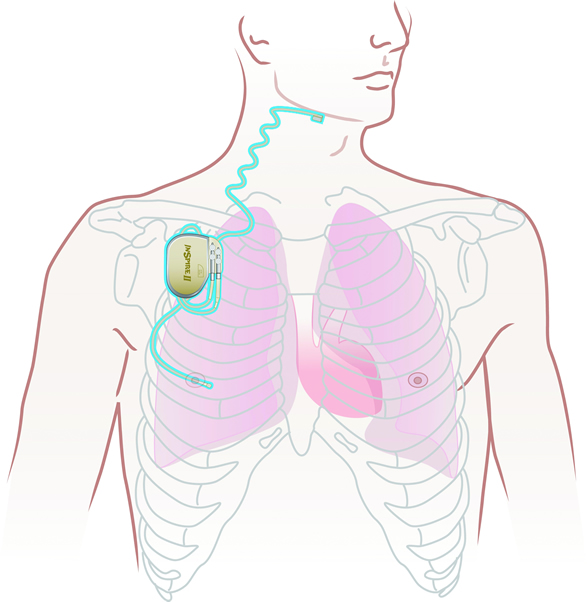
Nose & Mouth Conditions:
Congestion, allergic rhinitis, a deviated septum, and mouth sores are just a few of the varied health problems that occur in this region of the body. Information about ways you can relieve symptoms at home and when you should see a physician can be found in this section.
- Sinusitis
- Sinus Infection (PDF download)
- Polyps
- Obstruction (PDF download)
- Drainage (PDF download)
- Deviated Septum
- Allergic Rhinitis
- Nasal Fracture
Sleep Apnea
Obstructive Sleep Apnea is when breathing is disrupted during sleep for short periods due to an obstruction in the upper airway. 75% of people who snore have Obstructive Sleep Apnea. Studies show that around 80% of these cases go undiagnosed which increases the risk of heart attack, stroke, and diabetes in adults.
All those who snore with any of the following symptoms should be evaluated for possible Obstructive Sleep Apnea:
- Witnessed episodes of breath pauses or apnea during sleep
- Daytime sleepiness or fatigue
- High blood pressure
- Heart disease
- History of a stroke

Ear Conditions
Conditions that impair ear function can be as minor as wax buildup or as serious as congenital deafness. This section contains valuable information about how to protect your hearing, how to recognize indications of hearing disorders, and what ENT (head and neck) physicians can do to evaluate and treat these problems
- Ear Drainage
- Otitis Media
- Swimmer’s Ear
- Ear Wax (PDF download)
- Auricular hematoma
Hearing Conditions:
- Sensorineural Hearing Loss
- Noise Induced Hearing Loss
- Child Hearing Loss
- Age Related Hearing Loss
- Deafness
- Tinnitus
- Meniere’s Disease
- Sudden Hearing Loss (PDF download)
Throat Conditions:
Maladies of the throat can be a mere nuisance or a major ordeal. Tonsillitis, voice disorders, and even hoarseness all interfere with our ability to communicate. Many of these conditions can be improved or corrected with the care of an ENT physician or head and neck surgeon.
- Thyroid Nodules
- Tonsil and Adenoids
- Neck Cancer
- Reflux
- GERD
- LPR
- Infections
Head & Neck Conditions
Many surgical advances are being made in this area. Procedures such as tonsillectomy and facial plastic surgery are becoming less invasive, and new procedures are being developed to treat serious problems such as cleft palate, sleep apnea, and deafness.
- Bell’s Palsy
- Children and Facial Paralysis
- Children and Facial Trauma
- Cleft Lip and Cleft Palate
- Dizziness and Motion Sickness
- Facial Plastic Surgery
- Facial Sports Injuries
- Fine Needle Aspiration
- Head and Neck Cancer
- Pediatric Head and Neck Tumors
- Sinus Headaches
- Sinus Pain: Can Over-the-Counter Medications Help?
- Sinusitis: Special Considerations for Aging Patients
- Thyroid Disorders and Surgery
- TMJ Pain
Pediatric Conditions
Children face many of the same health problems that adults do, however symptoms may show themselves differently and treatment methods that work well in adults may not be appropriate for children. This section identifies common pediatric ENT, head and neck ailments, and what you should ask your child’s doctor about diagnosis and treatment.
- Allergic Rhinitis (Hay Fever)
- Child Screening
- Children and Facial Paralysis
- Children and Facial Trauma
- Cochlear-Meningitis Vaccination
- Could My Child Have Sleep Apnea?
- Day Care and Ear, Nose, and Throat Problems
- Facial Sports Injuries
- How Allergies Affect your Child’s Ears, Nose and Throat
- Laryngopharyngeal Reflux and Children
- Noise-Induced Hearing Loss in Children
- Pediatric Food Allergies
- Pediatric GERD (Gastro-Esophageal Reflux Disease)
- Pediatric Head and Neck Tumors
- Pediatric Obesity and Ear, Nose and Throat Disorders
- Pediatric Sinusitis
- Pediatric Thyroid Cancer
- Second Hand Smoke and Children
- When Your Child Has Tinnitus
- Why Do Children Have Earaches?
Cancer
Early detection is critical to preventing fatal outcomes. Cancers of the head and neck such as laryngeal cancer can be particularly aggressive. Signs of cancer of the head and neck include changes in the skin, pain, prolonged hoarseness, and sudden loss of voice. If you suffer from any of these symptoms you should see an ENT or head and neck physician immediately.
- Common Problems that Can Affect Your Voice
- Head and Neck Cancer
- Laryngeal (Voice Box) Cancer
- Pediatric Head and Neck Tumors
- Pediatric Thyroid Cancer
- Rhabdomyosarcoma
- Second Hand Smoke and Children
- Secondhand Smoke
- Skin Cancer
- Smokeless Tobacco

